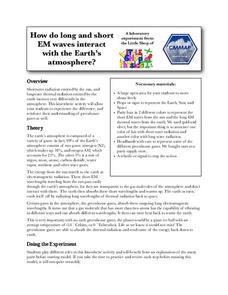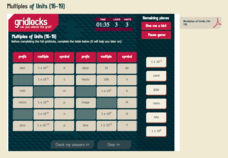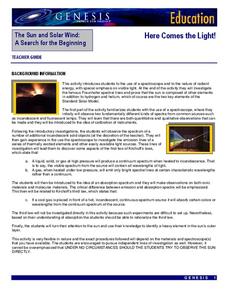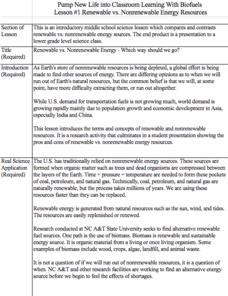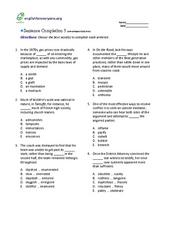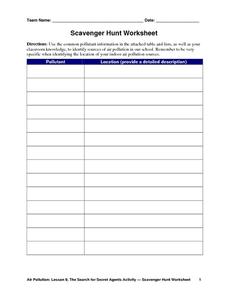Beyond Benign
Daphnia Bioassay LD50
De-icing materials may have a harmful effect on our environment; have your class perform an experiment to test the nature of these effects. Scholars monitor the survival rate of a sample of daphnia as the concentration of a de-icing...
DiscoverE
Rocket Challenge
You might just be responsible for launching a future career in rocket science. Pupils use Alka-Seltzer® tablets as the power source for a film-canister rocket. These rockets must able to carry a clay payload and hit a target on a wall.
Colorado State University
How Do Long and Short EM Waves Interact with the Earth's Atmosphere?
Things are about to heat up in your classroom! A kinesthetic lesson asks learners to play the part of the gases in the earth's atmosphere and interact with the sun's radiation. The focus is to learn the impact of the increasing...
Royal Society of Chemistry
Significant Figures
Ready to add some innovation to your significant figures lesson? Pupils practice sig fig rules using a puzzle approach. Check out the Teacher's Area for printable materials, an answer key, and strategies for implementing the resource.
Royal Society of Chemistry
Multiples of Units (16-19)
It's a parade of prefixes! Chemistry scholars identify common prefixes used throughout the sciences using an interactive puzzle series. Learners solve puzzles by pairing the prefixes with the power of ten they represent.
Royal Society of Chemistry
Symbols
Chemistry calculations can look a bit like alphabet soup at times. How do you help pupils make sense of it all? An interactive resource helps scholars sort through the symbols for common quantities such as moles, boiling point, and...
Royal Society of Chemistry
Born-Haber Cycle: NaCl
Max Born and Fritz Haber developed the Born-Haber cycle in 1916, which is used for measuring enthalpy that otherwise couldn't be measured. Young scientists solve four matching puzzles using their knowledge of the stages, standard...
NASA
Here Comes the Light!
Look beyond the light! An engaging activity introduces young scholars to the application of a spectroscope. The lesson is the fifth in a series of six and focuses on the analysis of the elements of the sun.
Nuffield Foundation
Measuring Respiratory Quotient
How do scientists prove tiny living things respire? Young scientists build a respirometer and measure respiration rates in living creatures. By comparing the measurements of both plants and animals, they understand the similarities.
Kenan Fellows
Renewable vs. Nonrenewable Energy Resources
Is one type of energy inherently good or bad? Young scientists explore energy resources in a week-long unit. After extensive research, groups create powerful position statements and presentations supporting their energy resource of choice.
CCSS Math Activities
Smarter Balanced Sample Items: 7th Grade Math – Claim 2
To solve or not to solve that is the problem. A slide presentation of 17 items show different ways that Smarter Balanced assesses Claim 2, problem solving. The items span from sixth and seventh grade concepts to highlight the...
American Museum of Natural History
The Milky Way Galaxy
Just how big is the galaxy? Learners read information about the size of the Milky Way galaxy to better comprehend its size. Pupils develop an understanding of the number of stars in the galaxy by finding just how big a billion is and...
American Museum of Natural History
Take the Climate Quiz
Climate and weather are often confused. Pupils answer questions online to review concepts related to climate and weather changes. They get immediate feedback and additional facts with each question. The lesson is appropriate as a remote...
American Museum of Natural History
Volcanoes Magma Rising
Get ready for an explosive lesson! Learners read and interact with an online lesson describing the characteristics of volcanoes. They study specific historical volcanoes as well as the science of volcanic eruptions using animations and...
Curated OER
Comet Myths, Facts, and Legends
Here is an interactive book lesson through which learners explore the facts and stories about comets. The plan is comprehensive, providing background information, standards met, vocabulary, assessment ideas, and more. Though the content...
Curated OER
Lead and Mercury Ion Catalase Inhibition
Students participate in a laboratory investigation in which they observe the effect of temperature and pH on enzyme activity. Students also examine exposure to heavy metal ions and the effect that may have on enzyme activity.
Curated OER
Organic Molecules Detected on Distant Planet!
Here is a planet worksheet in which learners read about organic molecules detected through spectral lines of the planet Osiris. They calculate the mass, the volume and the densities of common ingredients for planets including Osiris and...
Curated OER
Water Cycle Reading and Writing
Here is a great way to get pupils to express a scientific concept in a fun way. After hearing the story of Walter the Water drop and learning facts about the water cycle, the class will write a creative expository piece describing what...
K12 Reader
Plants Are Producers
Here's a handy two-part activity that uses an article about plants to assess reading comprehension. After reading the passage, kids answer questions based on the information in the text.
K12 Reader
Oxygen Exchange
An article about the vascular tissues inside plants provides an opportunity to assess reading comprehension. After reading the passage, kids respond to a series of comprehension questions.
Curated OER
Sentence Completion 5: Low-Advanced SAT Level
Sentence completion practice not only improves vocabulary, but critical thinking skills as well. Class members will benefit from exercises and the extended explanations that the answer key provides. Great SAT practice or class discussion...
Curated OER
Everyday Problems with Decimals
Review word problems and decimals with a worksheet that features everyday problems for your students to solve. Six problems provide space for both work and the solution, reinforcing the importance of showing one's work in word problems....
Curated OER
A Device That Condenses Water
Fifth graders who are studying water vapor and the condensation process use this worksheet to help them understand the process of condensation. Most of the worksheet is simply a source of information, with a good descriptive paragraph...
Curated OER
Scavenger Hunt Worksheet
Exactly how environmentally friendly is your school? From the air fresheners in the bathrooms to the cleaning solvents used in the classrooms, young conservationists search the school grounds for sources of air pollution in...
Other popular searches
- Solid Liquid Gas
- Gas Laws
- Gas Diffusion
- Natural Gas
- Solid, Liquid, Gas
- Gas Consumption
- Gas Molecules
- Nerve Gas
- Ideal Gas Law
- Combined Gas Law
- Gas Solubility
- Gas Lab


